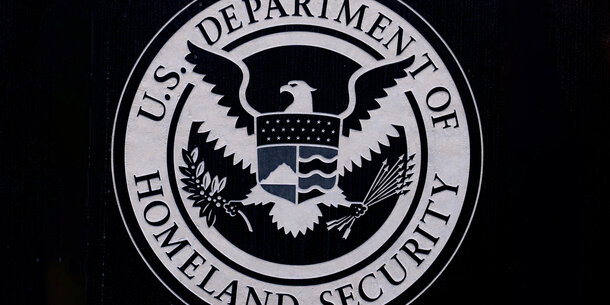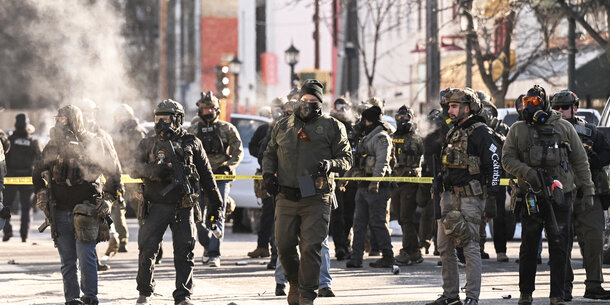You’re reading The Briefing, Michael Waldman’s weekly newsletter. Receive it in your inbox.
Last week in the Oval Office, the president was peeved when a reporter shared an acronym apparently used on Wall Street: TACO. Trump Always Chickens Out. The real question, however, isn’t over whether Trump will chicken out, but whether the Supreme Court will.
Major decisions on individual rights or state versus federal power defined past constitutional eras. It is increasingly clear that the great constitutional question of this time is the power of the presidency. When a chief executive acts illegally or abuses authority, will checks and balances hold?
So far, the lower federal courts have stood strong. Judges have issued dozens of rulings to curb abuse — by one count, at least 185 so far. It has been a heartening display of constitutional fortitude.
The most decisive recent ruling came in a court that sits a few blocks from the Brennan Center in Manhattan. The Court of International Trade hears disputes over trade practices and customs duties. Last Wednesday, a three-judge panel — appointed by Presidents Reagan, Obama, and Trump — struck down most of Trump’s tariffs.
As we’ve argued, presidents cannot single-handedly impose such tariffs. The Constitution explicitly gives that power to Congress. The International Emergency Economic Powers Act provides presidents lots of specific tools — just not this one.
A few hours later, another federal judge reached a similar conclusion. However, an appeals court kept the tariffs in place, for now. No doubt the matter will head to the Supreme Court soon. Count me nervous.
At such moments, traditional alignments scramble. The Brennan Center submitted a friend-of-the-court brief in a different case, Emily Ley Paper v. Trump. That one was brought by the New Civil Liberties Alliance, a conservative organization backed by the Koch brothers and the Federalist Society’s Leonard Leo. We disagree with the group on many things, but we’re proud to stand with them against this unambiguous constitutional abuse.
This dispute is part of a flotilla of cases headed to the high court challenging the presidential lawbreaking spree. Lower courts have had an extraordinary run of rulings — in cases brought by our allies such as Democracy Forward, the American Civil Liberties Union, and others — not because judges are being unduly activist, but because the White House has been unduly aggressive in breaking laws and norms.
Now comes an even harder part. As cases bubble up to appeals courts and then the Supreme Court, they will come before judges who are more ideological, more partisan, and often more sympathetic to presidential power. There is a risk that the heroic stand taken by judges in early 2025 will just be a fond memory.
That’s where we come in. Our Constitutional Crisis Litigation Project coordinates and writes friend-of-the-court briefs in many cases likely to reach the Supreme Court that will shape the role of the presidency. Scholars, former government officials, business leaders, and others will remind judges of their duties to the law and the Constitution. We will hold power accountable.
All this poses a big test for the Supreme Court — and the omens are not all good. Less than a year ago, the supermajority issued one of history’s worst rulings, granting presidents vast criminal immunity when they claim their actions are “official.”
Now these same justices will have to parse Trump’s bid to seize personal control of the government. They seem to be squirming to avoid a direct conflict.
In oral arguments last month, the justices appeared to agree that presidents cannot end birthright citizenship, the 14th Amendment’s explicit guarantee that if you are born in the United States, you are a citizen. Yet at the same time they may strip judges of the ability to issue nationwide orders to stop an unconstitutional law or executive action. It’s a complicated question. But there is no doubt that right now, an unwise ruling could clear the path for personal presidential rule in much of the government.
Then there is the question of whether a president can fire the leaders of an independent agency, such as the National Labor Relations Board. Late last month, the supermajority issued an unsigned two-page order that let the president fire agency leaders while the court cases challenging their removal from office continue. The National Review called it a “huge interim victory” for Trump. Hopefully with an emphasis on “interim” — when the justices finally hear a fully argued case, they may try to craft a narrower rule.
If the Court effectively eliminates the independence of such agencies, what about the Federal Reserve? Well, the Fed is just . . . different, the unsigned author enthused. It “is a uniquely structured, quasi-private entity that follows in the distinct historical tradition of the First and Second Banks of the United States.” Huh?
There are big rulings and cases to come — trillion-dollar questions that will shape the government and economy. Can presidents unilaterally shut down an agency created by law, such as the U.S. Agency for International Development? Can they simply refuse to spend money appropriated by Congress? Over the last few years, the justices propounded a new theory that purports to safeguard Congress’s role: the “major questions” doctrine. Does it apply only to Democratic presidents, or to Republican presidents too? Then there is the abuse of the Alien Enemies Act, the wartime statute Trump is now trying to use to deport immigrants in peacetime.
Trump may “always chicken out.” In 2025, the U.S. Supreme Court cannot.



